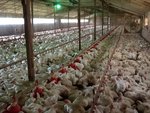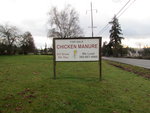


Foster Farms will pick up about 35,000 chickens at the end of December from Maple Crest Farms in Ridgefield for one final time. Then farm owners Marvin and Diane Gering will retire after 44 years in the chicken business.
The Gerings’ retirement will leave just three chicken farms in Clark County. Some 18 farms have existed at one time or another during the Gerings’ time in the business, none remaining in operation as long as the Gerings.
When the Gerings purchased the farm at 21115 NE 10th Ave., Ridgefield, in 1975, the farm raised 15,000 chickens at a time. The number swelled to 65,000 and then 110,000 as the Gerings built more buildings and took over the operation of another farm nearby. Since 2007, the farm has produced 35,000 chickens every two months.
Over the past 44 years, the farm has raised over 11.5 million chickens, most recently for Foster Farms, a company that has acquired competitors and is now the only major chicken company on the west coast of the United States.
“I liked the house,” said Marvin Gering, 75, who said he was at first attracted to the farm by the 1910-era, two-story home. Then Dan Shetler, a friend at church who operated the farm, invited Gering to visit the operation. “I saw a for sale sign in the yard,” said Gering. “Dan said possible buyers could not come up with the one-third down payment.”
The Gerings had just built a home in the Lake Shore area of Vancouver, doing the construction work by themselves. They had two children at the time, son Darin in kindergarten and daughter Karen in third grade. They were able to sell their Vancouver home and make the down payment on the farm. Daughter Dana arrived a year later to round out the family.
The Gerings both had farming backgrounds. Marvin had worked at a Tillamook, Oregon dairy and a Portland dairy processing plant. Diane grew up on a fruit orchard of the Yakima valley. They met at college in Idaho and were married in 1967.
One thing that appealed to Marvin about the chicken business was that, with 15,000 chickens, he only had to work an hour a day during the 47 days when chickens were growing, and then a day or two of cleanup between cycles. Thus he was able to maintain his processing plant job in Portland.
But as the farm expanded, Marvin decided to devote all his time to the chicken business. In 1982 he left his Portland job and worked full-time on the farm. When the farm expanded to 110,000 chickens, he worked eight to 10 hours a day. That lasted for three years. For about 25 years, from 1993 to 2016, Marvin also drove a school bus for Battle Ground Public Schools, always as a substitute. The Gerings said their three children learned about hard work as they grew up on the farm.
Business explained
Companies such as Foster Farms supply chicks, feed and delivery and pick up services to farmers who provide land, buildings, electricity, propane, shavings, water and labor. Each farm must have two water sources.
Chickens grow for about 47 days and are then picked up by the company. About two weeks later, a new crop of chicks are delivered. At present, the Gerings deal with Foster Farms, a California company with a plant in Longview. Marvin said that national Humane Society standards specify barn space of .75 square foot per chicken. That’s an area about 9-by-12 inches, he said.
Over the years the Gerings had contracts with Mid Valley Farms, Peterson Farms and Lynden farms, all since acquired by Foster Farms. At Longview, Foster Farms processes about 125,000 chickens per day, five days a week.
Marvin said the largest chicken company in the nation is Tyson Farms which handles about 22 million chickens per week. The growth rate of chickens over 47 days old declines and the grain expense goes up, said Marvin.
The company delivers a contracted number of chicks to a farm at the start of the 47 days, plus 4 percent extra to allow for deaths. Dead chickens can be either sent to a rendering plant or composted. The Gerings do both. About 1 percent of chicks die in the first week. Overall, the Gerings have experienced about a 3 percent loss rate.
In addition to chickens, the Gerings sell chicken manure as a garden fertilizer. At certain times of the year, the Gerings do not have enough manure to meet the demand.
The Gerings explained some of the problems in the chicken business. Without adequate ventilation, the ammonia level in a barn can rise which can cause chickens to go blind. Excessive heat can also lead to deaths and cold temperatures can reduce growth rates as chickens use more energy to stay warm.
Most eggs are produced in the southern part of the nation. Older hens can produce more porous shells which contribute to less healthy chicks and more losses.
Annual per capita chicken consumption in the United States has risen from about 28 pounds in 1960 to about 95 pounds today. Marvin said about 100 million chickens are processed in the United States each week, some for export.
What’s next?
The Gerings plan to remain on their farm for the next 2-3 years, then sell their 10 acres. Recent county planning changes have placed their property in a light industrial zone.
Gardening and family activities are in their future. All three of their children are married and each has two children of their own.
“It’s been a good living,” said Marvin, “and we’ve been successful. It’s a good time to exit.”
And yes, they eat plenty of chicken which Diane described as a meat with the greatest variety of preparation methods.